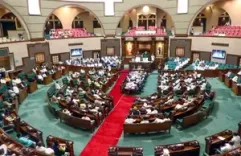Should CII Advocate for Central Legislation to Ensure Timely Service Delivery to Businesses?

Synopsis
Key Takeaways
- Central legislation is needed for timely service delivery.
- Improved regulatory certainty can enhance investor confidence.
- A digital system for service delivery is proposed.
- Integration with NSWS is recommended for efficiency.
- Grievance redressal mechanisms will ensure accountability.
New Delhi, July 27 (NationPress) The Confederation of Indian Industry (CII) has called on the government to establish a central legislation aimed at guaranteeing that Union Ministries and Departments deliver services to businesses within a specific timeframe.
As stated by the industry organization, this initiative would enhance regulatory certainty, facilitate an improved ease of doing business, and bolster investor confidence.
CII Director General Chandrajit Banerjee emphasized that a dedicated law specifying timelines for approvals, disbursements, and clearances at the central level would foster operational efficiency and reinforce long-term planning for businesses.
This framework would provide legal backing and institutional accountability for service delivery to businesses, he noted.
While several Indian states have enacted Right to Services Acts for citizens, no central legislation currently exists to ensure that services offered to businesses by Union Ministries are delivered promptly.
The CII asserts that implementing a similar framework at the national level would facilitate a more transparent and predictable business environment.
The proposed legislation, as envisioned by the CII, aims to ensure that services are delivered through a faceless and digital system, with explicit deadlines.
In instances of delayed approvals, provisions for deemed approvals with full legal validity would be integrated.
Authorities would be mandated to provide clear justifications for any rejections, and a robust grievance redressal mechanism would be established to address appeals and complaints promptly.
The CII also proposed that all business-related services be delivered solely through the National Single Window System (NSWS), the digital platform initiated by the government in 2021 for regulatory clearances.
It advocated for statutory backing for NSWS and its linkage with the proposed central legislation, making it the exclusive interface for businesses seeking approvals, renewals, and other regulatory services.
By ensuring complete integration of central ministries and departments with NSWS, the platform can function as a unified and transparent system for processing applications and guaranteeing timely service delivery.
The CII believes that this digital and legal framework would be pivotal in realizing the government’s India@100 vision of transforming into a global manufacturing and investment hub.









